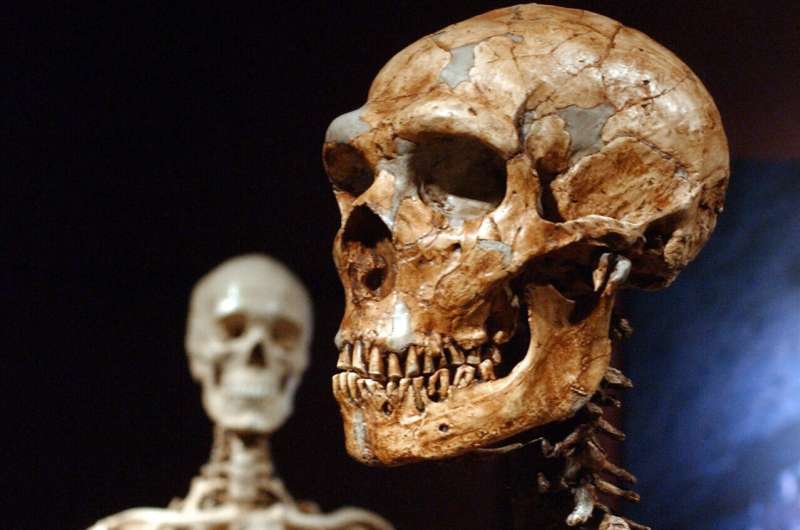
Posted on 07/17/2021 5:51:13 PM PDT by blam

This Wednesday, Jan. 8, 2003 file photo shows a reconstructed Neanderthal skeleton, right, and a modern human skeleton on display at the Museum of Natural History in New York.
What makes humans unique? Scientists have taken another step toward solving an enduring mystery with a new tool that may allow for more precise comparisons between the DNA of modern humans and that of our extinct ancestors.
Just 7% of our genome is uniquely shared with other humans, and not shared by other early ancestors, according to a study published Friday in the journal Science Advances.
"That's a pretty small percentage," said Nathan Schaefer, a University of California computational biologist and co-author of the new paper. "This kind of finding is why scientists are turning away from thinking that we humans are so vastly different from Neanderthals."
The research draws upon DNA extracted from fossil remains of now-extinct Neanderthals and Denisovans dating back to around 40,000 or 50,000 years ago, as well as from 279 modern people from around the world.
Scientists already know that modern people share some DNA with Neanderthals, but different people share different parts of the genome. One goal of the new research was to identify the genes that are exclusive to modern humans.
It's a difficult statistical problem, and the researchers "developed a valuable tool that takes account of missing data in the ancient genomes," said John Hawks, a paleoanthropologist at the University of Wisconsin, Madison, who was not involved in the research.
The researchers also found that an even smaller fraction of our genome—just 1.5%—is both unique to our species and shared among all people alive today. Those slivers of DNA may hold the most significant clues as to what truly distinguishes modern human beings.
(snip)
(Excerpt) Read more at phys.org ...
We have GOD’S DNA.
What is the other 93% unique to?
Bird poop?
Agreed.
Which shoots away the conclusions they want to draw.
Obviously that 7% makes a big difference.
7% unique to modern humans? Does that square with the old claim of human DNA being a 98% match to chimpanzees?
The research draws upon DNA extracted from fossil remains of now-extinct Neanderthals and Denisovans dating back to around 40,000 or 50,000 years ago...
So DNA can last 40,000-50,000 years? Ya Right.
Therefore, we can believe 93% of what the Bible says about human nature at face value, and have faith about the 7%.
Look at those teeth. Must be British.
This topic was posted , thanks blam.
The 7% solution...
Maybe you are lucky and only have the universal 1.5%.
Perhaps what we have is kinds of genes that are in common with the great apes, but not identical genes.
Why am I not surprised?
Humans and chimps share 98.8 percent of their DNA...............................
But they told us we shared 99% of our DNA with chimps.
Disclaimer: Opinions posted on Free Republic are those of the individual posters and do not necessarily represent the opinion of Free Republic or its management. All materials posted herein are protected by copyright law and the exemption for fair use of copyrighted works.